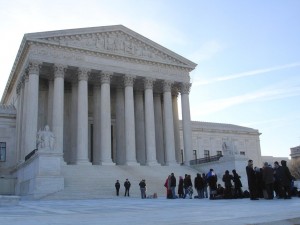 The US Supreme Court today upheld Michigan’s ban on affirmative action which forbids racial preferences in state university admissions.
The US Supreme Court today upheld Michigan’s ban on affirmative action which forbids racial preferences in state university admissions.
Despite all the talk that Asian Americans play a major role in the anti-affirmative action movement, not one of the four opinions in the case even mentioned Asian Americans, according to a blog by Ilya Somin in the Washington Post.
Anti-affirmative action forces in the Chinese American community are largely credited with stopping an effort to overturn a similar affirmative action ban, proposition 209, in California.
According to the Mercury News, today’s Scotus ruling further entrenches 209.
Now only the legislature or voters in California can overturn 209. But as we saw last month in the SCA5 fight, that will not be easy.
Despite that, the man behind that effort, State Sen. Ed Hernandez (D-West Covina), says he is determined to try again. Others, however, are skeptical.
“Prop. 209 is here to stay, and I don’t think we’re going to hear a lot about reforming it in the near future,” predicted Terry Christensen, a political-science professor emeritus at San Jose State.
Today, Asian American Advancing Justice, in response to the ruling said the Supreme Court had “turned its back on our nation’s commitment to racial equality and equal treatment under the law.
” Racial minorities and others fighting for integration and equality must now overcome the huge task of passing a constitutional amendment to secure constitutionally permissible race-conscious programs, while all others, including alumni and game-day boosters may simply lobby the Regents directly for their own admissions considerations.
“We have seen the devastating impact of the unequal political process created by California’s own identical ban on affirmative action, Prop 209. It has led to a re-segregation of public higher education in this state and admissions processes that turn a blind eye to the effects of racism and inequality in K-12 education, the biased limitations of standardized testing, and the real-life experiences and obstacles that minority applicants face. The recent setback in efforts to legislatively repeal Prop 209 only underscore the reality of the unequal political process for minority groups.”
Surprisingly, the 80-20 Initiative, the Asian American PAC most outspoken against affirmative action, did not issue a statement in response to today’s ruling.
However, Somin, in his blog for the Post argued that the political restructuring doctrine which Justice Sonia Sotomayor in her minority opinion used to defend affirmative action, can no longer apply. The doctrine holds that shifting a decision on a public policy issue from one branch of government to another is unconstitutional if it disadvantages minorities.
Somin argues that is no longer true if affirmative action affects Asian Americans differently from African Americans and Latinos. You can read more of Somin’s argument in the Washington Post.
You can read more about what’s ahead for Proposition 209 in California in the Mercury News.




RE: The impact of the anti-affirmative action ruling on Asian Americans: Hear, hear. Going to be following 80-20 in the future